Book contents
- From Bud to Brain: A Psychiatrist’s View of Marijuana
- From Bud to Brain: A Psychiatrist’s View of Marijuana
- Copyright page
- Dedication
- Contents
- Foreword
- Acknowledgments
- Introduction
- Section 1 The Science of Marijuana and the Brain
- Chapter 1 Monumental Marijuana Discoveries
- Chapter 2 Marijuana’s Acute Effects
- Chapter 3 Flies in the Ointment
- Chapter 4 Epidemiology
- Chapter 5 The Impacts of Ongoing Marijuana Use on the Brain
- Chapter 6 The Impacts of Ongoing Marijuana Use on the Mind: Section 1
- Chapter 7 The Impacts of Ongoing Marijuana Use on the Mind: Section 2
- Chapter 8 The Impacts of Ongoing Marijuana Use on Adolescent Psychology
- Chapter 9 Secondhand Marijuana: Prenatal Cannabis Exposure
- Section 2 The Science and Art of Healing
- Section 3 The History and Art of Marijuana Policy
- Section 4 Epilogue
- Index
Chapter 9 - Secondhand Marijuana: Prenatal Cannabis Exposure
from Section 1 - The Science of Marijuana and the Brain
Published online by Cambridge University Press: 31 March 2020
- From Bud to Brain: A Psychiatrist’s View of Marijuana
- From Bud to Brain: A Psychiatrist’s View of Marijuana
- Copyright page
- Dedication
- Contents
- Foreword
- Acknowledgments
- Introduction
- Section 1 The Science of Marijuana and the Brain
- Chapter 1 Monumental Marijuana Discoveries
- Chapter 2 Marijuana’s Acute Effects
- Chapter 3 Flies in the Ointment
- Chapter 4 Epidemiology
- Chapter 5 The Impacts of Ongoing Marijuana Use on the Brain
- Chapter 6 The Impacts of Ongoing Marijuana Use on the Mind: Section 1
- Chapter 7 The Impacts of Ongoing Marijuana Use on the Mind: Section 2
- Chapter 8 The Impacts of Ongoing Marijuana Use on Adolescent Psychology
- Chapter 9 Secondhand Marijuana: Prenatal Cannabis Exposure
- Section 2 The Science and Art of Healing
- Section 3 The History and Art of Marijuana Policy
- Section 4 Epilogue
- Index
Summary
Research regarding the impact of in utero exposure to marijuana lags behind other areas of interest despite frequent use during pregnancy. The endocannabinoid system is intimately involved with guiding embryonic and fetal axon development and THC has been shown to disrupt microtubules in axonal growth cones, raising concern for potential long term consequences. While no gross birth defects have been associated with prenatal exposure to marijuana, some reduction in birth weight is common. Only three long term studies provide data on the consequences of prenatal exposure: OPPS (Canada), MHPCD (US), and Generation R (Netherlands). Immediate effects on newborns include increased tremors, exaggerated startle, a high-pitched cry and abnormal sleep cycling. Disturbances in memory and verbal development, sustained attention, increased impulsivity and hyperactivity have been documented at various ages from early childhood through the first two decades of life. fMRIs during executive function testing in 18-22-year-olds prenatally exposed to marijuana reveal compensatory recruitment of wider areas of cortex than in controls. Psychological and behavioral problems have also been reported as early as age 6. Both pediatricians (AAP) and obstetricians (ACOG) caution against marijuana use during pregnancy and lactation.
- Type
- Chapter
- Information
- From Bud to Brain: A Psychiatrist's View of Marijuana , pp. 125 - 136Publisher: Cambridge University PressPrint publication year: 2020

